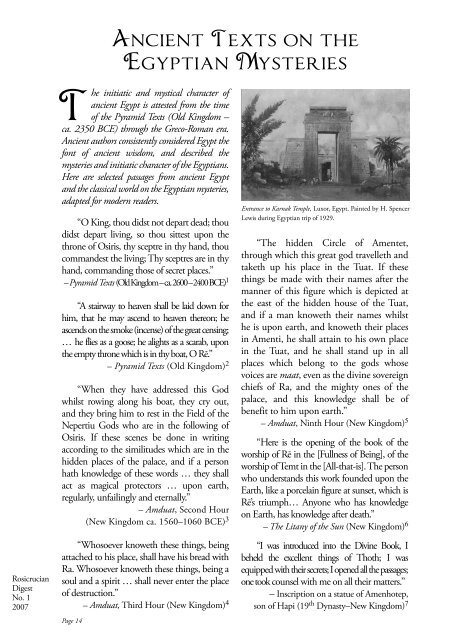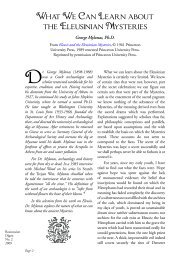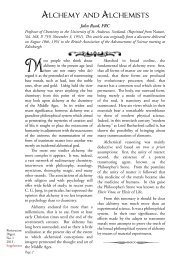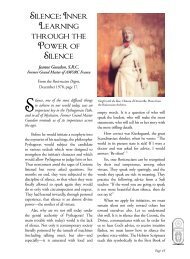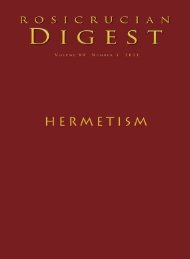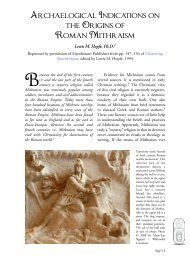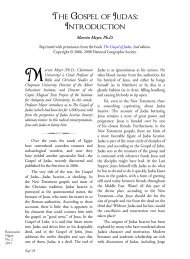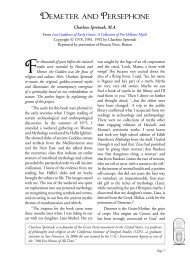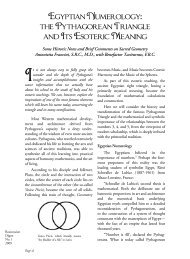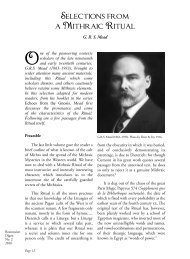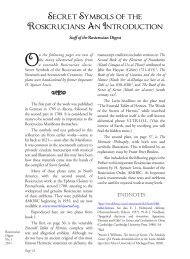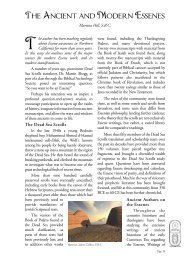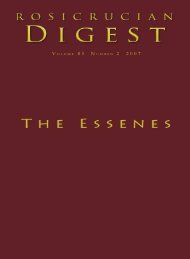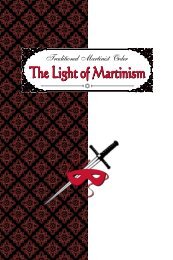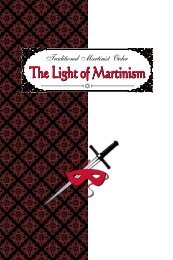Digest - Rosicrucian Order
Digest - Rosicrucian Order
Digest - Rosicrucian Order
You also want an ePaper? Increase the reach of your titles
YUMPU automatically turns print PDFs into web optimized ePapers that Google loves.
<strong>Rosicrucian</strong><br />
<strong>Digest</strong><br />
No. 1<br />
2007<br />
The initiatic and mystical character of<br />
ancient Egypt is attested from the time<br />
of the Pyramid Texts (Old Kingdom –<br />
ca. 2350 BCE) through the Greco-Roman era.<br />
Ancient authors consistently considered Egypt the<br />
font of ancient wisdom, and described the<br />
mysteries and initiatic character of the Egyptians.<br />
Here are selected passages from ancient Egypt<br />
and the classical world on the Egyptian mysteries,<br />
adapted for modern readers.<br />
“O King, thou didst not depart dead; thou<br />
didst depart living, so thou sittest upon the<br />
throne of Osiris, thy sceptre in thy hand, thou<br />
commandest the living; Thy sceptres are in thy<br />
hand, commanding those of secret places.”<br />
– Pyramid Texts (Old Kingdom – ca. 2600 –2400 BCE) 1<br />
“A stairway to heaven shall be laid down for<br />
him, that he may ascend to heaven thereon; he<br />
ascends on the smoke (incense) of the great censing;<br />
… he flies as a goose; he alights as a scarab, upon<br />
the empty throne which is in thy boat, O Rē.”<br />
– Pyramid Texts (Old Kingdom) 2<br />
“When they have addressed this God<br />
whilst rowing along his boat, they cry out,<br />
and they bring him to rest in the Field of the<br />
Nepertiu Gods who are in the following of<br />
Osiris. If these scenes be done in writing<br />
according to the similitudes which are in the<br />
hidden places of the palace, and if a person<br />
hath knowledge of these words … they shall<br />
act as magical protectors … upon earth,<br />
regularly, unfailingly and eternally.”<br />
– Amduat, Second Hour<br />
(New Kingdom ca. 1560–1060 BCE) 3<br />
“Whosoever knoweth these things, being<br />
attached to his place, shall have his bread with<br />
Ra. Whosoever knoweth these things, being a<br />
soul and a spirit … shall never enter the place<br />
of destruction.”<br />
– Amduat, Third Hour (New Kingdom) 4<br />
Page 14<br />
Entrance to Karnak Temple, Luxor, Egypt. Painted by H. Spencer<br />
Lewis during Egyptian trip of 1929.<br />
“The hidden Circle of Amentet,<br />
through which this great god travelleth and<br />
taketh up his place in the Tuat. If these<br />
things be made with their names after the<br />
manner of this figure which is depicted at<br />
the east of the hidden house of the Tuat,<br />
and if a man knoweth their names whilst<br />
he is upon earth, and knoweth their places<br />
in Amenti, he shall attain to his own place<br />
in the Tuat, and he shall stand up in all<br />
places which belong to the gods whose<br />
voices are maat, even as the divine sovereign<br />
chiefs of Ra, and the mighty ones of the<br />
palace, and this knowledge shall be of<br />
benefit to him upon earth.”<br />
– Amduat, Ninth Hour (New Kingdom) 5<br />
“Here is the opening of the book of the<br />
worship of Rē in the [Fullness of Being], of the<br />
worship of Temt in the [All-that-is]. The person<br />
who understands this work founded upon the<br />
Earth, like a porcelain figure at sunset, which is<br />
Rē’s triumph… Anyone who has knowledge<br />
on Earth, has knowledge after death.”<br />
– The Litany of the Sun (New Kingdom) 6<br />
“I was introduced into the Divine Book, I<br />
beheld the excellent things of Thoth; I was<br />
equipped with their secrets; I opened all the passages;<br />
one took counsel with me on all their matters.”<br />
– Inscription on a statue of Amenhotep,<br />
son of Hapi (19 th Dynasty–New Kingdom) 7


